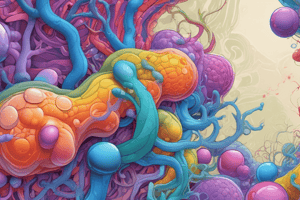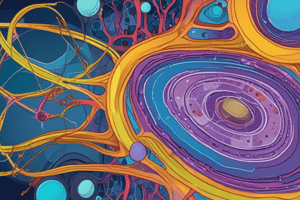Podcast
Questions and Answers
What is the primary difference between simple diffusion and facilitated diffusion?
What is the primary difference between simple diffusion and facilitated diffusion?
- Facilitated diffusion requires energy, whereas simple diffusion does not
- Facilitated diffusion involves transport proteins, whereas simple diffusion does not (correct)
- Simple diffusion involves transport proteins, whereas facilitated diffusion does not
- Simple diffusion requires energy, whereas facilitated diffusion does not
In which direction does osmosis occur?
In which direction does osmosis occur?
- From an area of high solute concentration to an area of low solute concentration
- From an area of low water concentration to an area of high water concentration
- From an area of high water concentration to an area of low water concentration
- From an area of low solute concentration to an area of high solute concentration (correct)
What is the primary characteristic of active transport?
What is the primary characteristic of active transport?
- It involves the movement of molecules from an area of low concentration to an area of high concentration
- It requires energy in the form of ATP (correct)
- It does not require energy
- It only occurs through a selectively permeable membrane
Which of the following types of transport does not require energy?
Which of the following types of transport does not require energy?
What is the direction of molecule movement in simple diffusion?
What is the direction of molecule movement in simple diffusion?
What is the primary function of transport proteins in facilitated diffusion?
What is the primary function of transport proteins in facilitated diffusion?
What is the result of a concentration gradient on the movement of molecules in active transport?
What is the result of a concentration gradient on the movement of molecules in active transport?
What is the key difference between osmosis and facilitated diffusion?
What is the key difference between osmosis and facilitated diffusion?
In which type of transport process is the movement of molecules from an area of low concentration to an area of high concentration?
In which type of transport process is the movement of molecules from an area of low concentration to an area of high concentration?
What is the role of ATP in active transport?
What is the role of ATP in active transport?
Flashcards are hidden until you start studying
Study Notes
Types of Cellular Transport
- Simple Diffusion: Movement of molecules from high concentration to low concentration areas without energy or transport proteins.
- Characteristics: No energy required, no transport proteins involved, moves from high to low concentration.
Assisted Cellular Transport
- Facilitated Diffusion: Movement of molecules across the membrane via specific transport proteins, no energy required.
- Key feature: Involves transport proteins, but no energy is needed.
Water Transport
- Osmosis: Diffusion of water through a selectively permeable membrane from low solute concentration to high solute concentration areas.
- Direction: Water moves from low solute concentration to high solute concentration areas.
Energy-Dependent Transport
- Active Transport: Movement of molecules against their concentration gradient, requiring energy in the form of ATP and transport proteins.
- Key feature: Energy from ATP is required to move molecules against their concentration gradient.
Studying That Suits You
Use AI to generate personalized quizzes and flashcards to suit your learning preferences.




